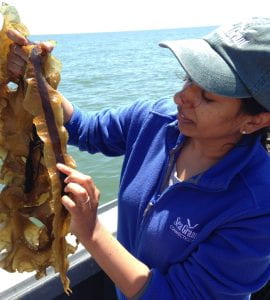Photo above: SBU’s Bassem Allam is the lead PI on a study of hard clams (photo by Bassem Allam); Inset photo: A worker at Norm Bloom & Son Oysters offloads shellfish harvested from the company’s beds in Norwalk, CT (photo by Judy Benson, Connecticut Sea Grant).
From NY Sea Grant Contributes to Marine Aquaculture Research Projects on Stony Brook News, November 14, 2019
Two important aquaculture studies on New York’s marine waters will be administered at Stony Brook University through New York Sea Grant (NYSG). These projects are part of a national suite of 42 research projects and collaborative programs supported by $16 million in federal funding by the National Oceanic and Atmospheric Administration (NOAA) to advance sustainable aquaculture in the United States.
“Aquaculture as a source of sustainable food, healthy habitat and clean water, and economic opportunity has gained considerable, and growing, national and global attention in the past several years. However, there is still much to learn. New York Sea Grant is pleased to be able to participate with diverse partners on a suite of grants supporting collaborative research aimed at understanding and informing the potential of shellfish, finfish, and seaweed aquaculture across the state,” said NYSG Director Dr. Rebecca Shuford.
NYSG’s contribution to aquaculture research supports three areas of need identified by the National Sea Grant Office federal funding opportunities. These areas include accelerating the development of aquaculture in established topics, exploring new opportunities, as well as addressing gaps in social, behavioral, and economic research relating to US aquaculture.
New York Sea Grant (NYSG), a cooperative program of Cornell University and the State University of New York (SUNY), is one of 33 university-based programs under the National Oceanic and Atmospheric Administration’s National Sea Grant College Program.
More About the Projects
East Coast Hard Clam Selective Breeding Collaborative Project
This project — a $1.2 million collaborative effort with NYSG and Stony Brook University along with Cornell University, Rutgers University and the Virginia Institute of Marine Sciences — will apply selective breeding to improve the resilience of hard clam stocks cultured across the Atlantic seaboard. Bassem Allam, Marinetics Endowed Professor at the School of Marine and Atmospheric Sciences at Stony Brook University is lead PI on this project, which also includes shellfish biologists and geneticists, Sea Grant and Cornell Cooperative Extension specialists, and industry partners located in five states (Florida, Massachusetts, New Jersey, New York and Virginia) where there is significant hard clam aquaculture.
Nurturing Successful Growth and Maturation of a Domestic Seaweed Aquaculture Industry: Identifying and Removing Barriers and Promoting Opportunities

Connecticut Sea Grant Aquaculture Specialist Anoushka Concepcion the PI on a new National Sea Grant Seaweed Hub (photo by Tessa Getchis).
The second NYSG project is a nearly $1.1 million collaborative effort led by Connecticut Sea Grant, partnering with the National Sea Grant Law Center and various other Sea Grant programs to establish a National Sea Grant Seaweed Hub that will serve as a central clearinghouse for science-based, non-proprietary resources related to previous and current seaweed aquaculture research and extension efforts.
Other Projects
In addition to federal funding awarded to the East Coast marine research projects, NYSG is also part of a three-year, $1 million multi-state Great Lakes Aquaculture Collaborative project designed to help Great Lakes States respond to consumer demand for freshwater fish and address the $14 billion national seafood trade deficit identified by the NOAA National Marine Fisheries Service.
For more information on the 42 research projects and collaborative programs supported, see the National Sea Grant College Program announcement.
Additional Coverage:





You must be logged in to post a comment.